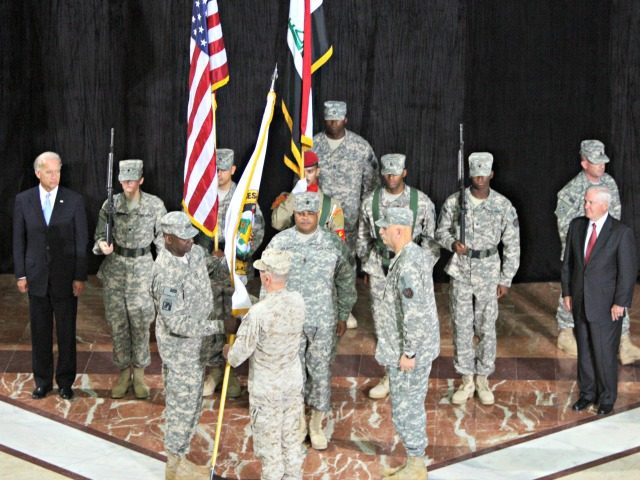Former Defense Secretary Jim Mattis criticized former Vice President Joe Biden in his new book, Call Sign Chaos, for wanting to pull U.S. troops out of Iraq, despite assessments from the intelligence community that progress would be reversed.
Mattis recalled being in Baghdad for a change of command ceremony in late summer 2010, a time when Al Qaeda had been driven “to its knees.” He wrote:
The question was: what to do now? If we pulled out abruptly intelligence reports warned, Iraq would fall back into civil war, allowing the jihadist terrorists to regenerate. The residual American force was the glue holding Iraq together and helping prevent terrorist resurgence.
The Obama White House supported the incumbent prime minister, Nouri al-Maliki, despite him garnering less votes than the opposition in recent elections. Mattis said he was opposed to backing Maliki.
Mattis recalled having dinner after the change of command ceremony with Biden, then-U.S. Ambassador to Iraq Jim Jeffrey, White House staffers, and U.S. generals. He told Biden, “Prime Minister Maliki is highly untrustworthy, Mr. Vice President.”
He wrote:
If we pulled out troops too early, I noted, we would have to bring our troops back in. I argued that we had to stay and emphasized what our intelligence community assessed: our progress was not yet ingrained, and it was ‘reversible’ if we didn’t stay.
Vice President Biden and his assistants listened politely. But as we spoked, I sensed I was making no headway in convincing the administration officials not to support Maliki. It was like talking to people who lived in wooden houses but saw not need for a fire department. I saw that the die was already cast.
…
‘Maliki wants us to stick around, because he does not see a future in Iraq otherwise,’ Biden said, ‘I’ll bet you my vice presidency.’
I liked the Vice President. After dinner, he kidded me about my command. ‘Know why you’re at CENTCOM?’ he teased. ‘Because no was else was dumb enough to take the job.’ I found him an admirable and amiable man. But he was past the point where he was willing to entertain a ‘good idea.’ He didn’t want to hear more; he wanted our forces out of Iraq. Whatever path led there the fastest, he favored. He exuded the confidence of a man whose mind was made up, perhaps even indifferent to considering the consequences were he judging the situation incorrectly.
Mattis said Central Command, the Chairman of the Joint Chiefs of Staff, the new Defense Secretary Leon Panetta, and then-Secretary of State Hillary Clinton wanted to leave some U.S. forces in Iraq. He wrote that then-Centcom Commander Army Gen. Lloyd Austin wanted to leave 18,000 U.S. troops there, and he agreed with that number. But the Obama administration was determined to draw down all U.S. troops, he wrote.
He recalled Obama saying in the fall of 2012: “I said I’d end the war in Iraq. I ended it.”
“Rhetoric doesn’t end conflicts,” Mattis wrote. As intelligence assessments predicted, Iraq “slipped back into escalating violence,” and “the medieval scourge called ISIS rose like a phoenix and swept across western Iraq and eastern Syria, routing the Iraqi Army and establishing its murderous caliphate.”
“Supporting a sectarian Iraqi prime minister and withdrawing all U.S. troops were catastrophic decisions, based on the conditions at the time,” Mattis wrote.
Mattis was asked Sunday on CBS News’ Face the Nation why he has refused to criticize the Trump administration in his book but has criticized Biden.
He said he started writing the book in 2013, long before he knew Biden would be a presidential candidate.
“Had I known the former vice president was going to run for office, I assure you, I would not have probably been that- that forthcoming,” he said.
Asked whether Mattis was raising questions about Biden’s judgment, Mattis reiterated his criticism:
“I think the Obama administration- President Obama’s administration had made the decision to leave Iraq despite what the intelligence community was telling us would happen. They were very clear that an Al-Qaeda associated group would rise, that the Iraqi government, the Iraqi people, the Iraqi nation was in a post-combat, pre-reconciliation phase. We needed to keep our influence there a little longer and draw down year by year. Not draw everyone out at one time. The intelligence community was very clear. They forecasted the rise of a group, you and I know it as ISIS, and we should have taken their advice on board”

COMMENTS
Please let us know if you're having issues with commenting.